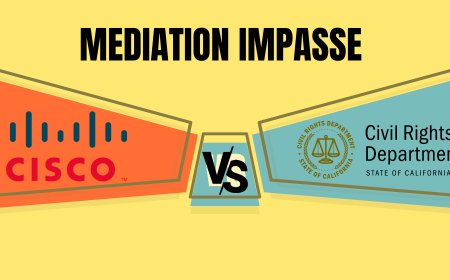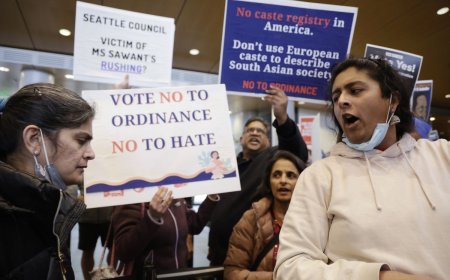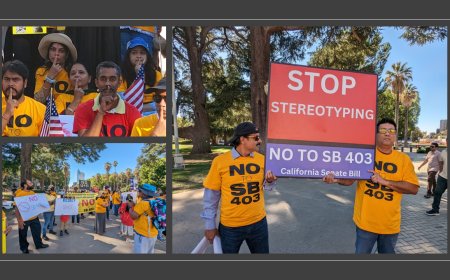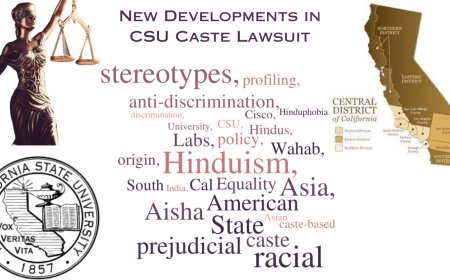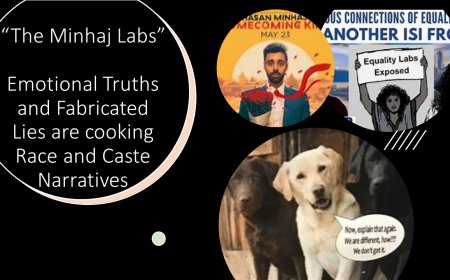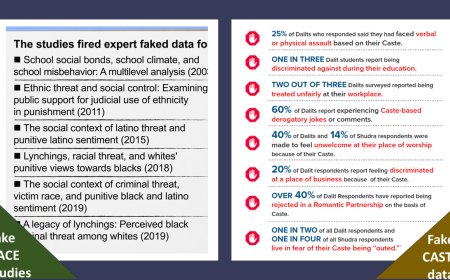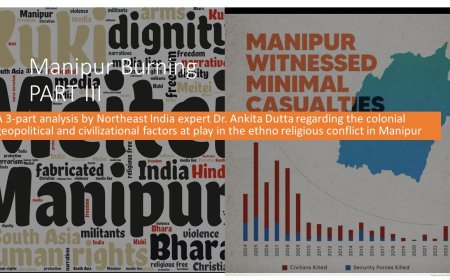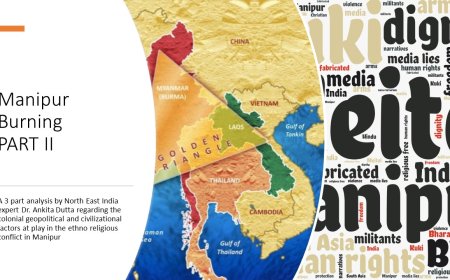The Caste Rigmarole - Rutgers, NCRI, DEI, and Caste
A Rutgers University and Network Contagion Research Institute (NCRI) report titled 'Instructing Animosity' explains how DEI Pedagogy Produces 'Hostile Attribution Bias' The report reveals that Diversity, Equity, and Inclusion (DEI) initiatives work adversely, fostering unintended authoritarian tendencies and racial tensions. The study highlights the flaws in caste-based DEI training, particularly those by Equality Labs, which amplify biases against Hindus and promote dehumanizing rhetoric. Participants exposed to such narratives displayed increased prejudice, suspicion, and punitive behaviors. The report urges businesses and institutions to critically assess their DEI programs to prevent fostering division and hostility instead of inclusivity.

On November 25, 2024, A joint research report published by Rutgers University and the Network Contagion Research Institute (NCRI) titled INSTRUCTING ANIMOSITY: HOW DEI PEDAGOGY PRODUCES THE HOSTILE ATTRIBUTION BIAS validated CasteFiles' stance regarding the harmful impact of Caste rhetoric, policy and profiling in the global lexicon.
Although DEI initiatives are designed to foster a more equitable and inclusive environment, the data suggests that they may unintentionally cultivate an atmosphere of ideological conformity, which can exhibit authoritarian tendencies.
DEI has become a major industry, with corporations spending billions annually and involving millions of workers in training and meetings. However, the effectiveness of these initiatives is questionable, as some programs have backfired, leading to increased racial tension and resentment.
A significant finding from the NCRI DEI study is that the vitriolic discourse employed by self-proclaimed opponents of casteism and fascism can have the counterintuitive effect of fostering authoritarian tendencies and classic indicators of fascism among individuals exposed to such rhetoric. Specifically, test subjects who were subjected to Equality Labs' characterization of Hinduism were more likely to exhibit authoritarian behaviors.
The Rutgers-NCRI report states, “Yet, the prevalence and impact of caste discrimination remain poorly studied and largely speculative. Research by Pew indicates that few American Hindus born in the U.S. identify strongly with caste, with less than half reporting any connection to a caste group. Furthermore, one of the most cited research articles establishing the prevalence of caste discrimination, conducted by Equality Labs, has been widely criticized by the Carnegie Endowment for International Peace and others for methodological flaws, including unrepresentative sampling and reliance on unverified self-reported experiences. This raises significant concerns about the validity of the ascendant narrative that caste discrimination is a pervasive problem in the U.S. and suggests that the promotion of caste-related DEI training has not emerged as a result of robust empirical evidence that caste discrimination is a genuine problem.”
The Rutgers-NCRI report outlines the timeline of how the concept of caste discrimination gained traction in the U.S., leading to the perceived need to protect "caste" as a category against discrimination across various sectors. This timeline begins with Brandeis University in Massachusetts adding caste to its non-discrimination policy in December 2019. It includes significant events such as the CISCO caste discrimination case and similar policy additions by Harvard University, Colby College, Brown University, and California State University. The timeline also covers the dismissal of the CISCO case, the Seattle council's bill to add caste as a protected category, the California Senate's approval of the controversial SB403 bill, and its eventual veto by California Governor Gavin Newsom.
The NCRI-Rutgers report indicates that certain anti-oppressive DEI narratives may foster hostile attribution bias, racial suspicion, prejudicial attitudes, authoritarian policing, and support for punitive actions without evidence. The report highlights that DEI training programs can deeply instill biases, prejudices, and hatred to the extent that rhetoric similar to Hitler's becomes acceptable and is considered for implementation against specific caste groups, such as Brahmins.
DEI initiatives, particularly those targeting Hindus with caste-based discrimination narratives, often backfire, fostering division, hostility, and bias rather than promoting inclusivity.
The study highlights methodological flaws in Equality Labs’ caste sensitivity training, which, instead of fostering understanding, increases assumptions of bias, promotes demonization, and amplifies prejudice against Hindus.
Participants exposed to Equality Labs materials exhibited increased acceptance of hateful, dehumanizing rhetoric against Hindus, with demonizing terms adapted from Hitler's quotes gaining significant support.
Research by Pew actually indicates that few American Hindus born in the US identify strongly with caste, with less than half reporting any connection to a caste group.
Analysis revealed that exposure to the Equality Labs intervention significantly increased participants’ perception of microaggressions, perceived harm, and assumptions of bias during the interview process, with increases of 32.5%, 15.6%, and 11%, respectively, compared to the control group.
Additional questions assessed whether reading the Equality Lab's caste sensitivity essay negatively influenced participants' assumptions about Hindus' racist attitudes and increased their willingness to punish the fictional college administrator. Shockingly, participants who read the Equality Labs essay were 19% more likely to punish the administrator and 47.5% more likely to perceive Hindus as racist compared to the control group.
The Rutgers NCRI report also revealed a significant increase in agreement with demonizing statements adapted from Adolf Hitler's quotes, replacing "Jew" with "Brahmin." Statements like "Brahmins are parasites," "Brahmins are viruses," and "Brahmins are the devil personified" gained significant support from participants exposed to the DEI content, with increases of 35.4%, 33.8%, and 27.1%, respectively.
Study participants exposed to the Equality Labs narrative were more likely to view ALL Hindus as racist, more likely to perceive bias without any evidence of bias, and alarmingly more willing to punish perceived “oppressors.” In a particularly shocking finding, after reading the Equality Labs content, participants were MUCH MORE LIKELY to AGREE with Hitler’s quotes (with the word “Brahmin” replacing “Jew”). Exposure to anti-casteism DEI content led to a 35% increase in agreement with Hitler's quotes when we replaced the term "Jews" with upper-caste members.
The NCRI report further emphasized, “This heightened suspicion triggers authoritarian policing tendencies, leading people to endorse surveillance and purity testing, strict social controls, and escalating responses from corrective to coercive.”
The report confirms that training individuals to view the Hindu and Indian community through the lens of "oppressive upper castes" and "oppressed lower castes," as promoted by Equality Labs, may inadvertently target Hindu communities for increased surveillance and scrutiny by mainstream Americans.
As it becomes evident that caste surveys and caste training programs can foster biases and prejudices against specific caste and racial groups while generating unwarranted sympathy for certain communities, contrary to their intended goal of promoting inclusivity and reducing prejudices, businesses and institutions must examine their DEI and caste policies closely.
https://x.com/ncri_io/status/1861086102519787695




